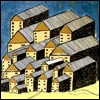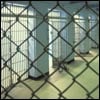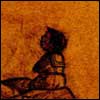Chanukah isn’t over yet, and rabbinical students Mendel Leverton and Zalman Kaplan have already covered nearly 1,000 miles of Ohio this week. The purpose of their roadtrip? Visiting Jewish inmates across the state, bringing the light and joy of Chanukah into society’s darkest corner: the prison system.
The students have been to around a dozen prisons on their journey. “We were there to share an inspirational good word, to go over the blessings with them and to inquire with them if there are any issues they’re having with religious observance,” Leverton, who lives in the Crown Heights neighborhood of Brooklyn, N.Y., tells Chabad.org. “We played dreidel with them, sang with them, danced with them and tried to give them a feeling of joy. If we can bring them a feeling of love and warmth when we come to visit them, that’s something special to us.”
Continuing a decades-long tradition, this year the Chabad-Lubavitch-affiliated Aleph Institute—the leading Jewish organization caring for the incarcerated and their families—sent dozens of rabbinical students like Leverton and Kaplan to more than 100 prisons across the United States. The volunteers organize Chanukah parties where they light the menorah, speak about the message of the holiday, sing songs and just lend a listening ear. In the facilities that permit it, they bring in traditional doughnuts and latkes. When the visits take place during the day, they are able to put on tefillin with the men.
Aleph has additionally sent out 331 menorahs, 548 boxes of candles, 600 dreidels, and 929 Chanukah chocolate bars to incarcerated men and women across the country.
Aleph has also sent gifts to some 220 Jewish children who have a parent in prison. Before Chanukah, Aleph's Family Services team sends forms to moms, dads, and grandparents in prison asking for their children’s names, ages, and interests. Aleph then buys an individual gift for each child and sends it with a personalized note that their parent or a family member has dictated.
“I never thought something so small would go so far,” one mother wrote after her daughter received her Chanukah present—a teddy bear, the package also including a letter from her father.. The girl danced around the house with her gift. “She sleeps with her teddy bear every night,” said the mom. “It’s her connection to Daddy.”
Another mother wrote: “My son was kissing the gift, thinking his father wrapped and picked it out. Today, we had light in our house!”

Sharing the Rebbe’s Concern
The Aleph Institute was founded in 1981 at the direction of the Rebbe, Rabbi Menachem M. Schneerson, of righteous memory, whose legendary concern for humanity at large extended to the incarcerated. The criminal justice system, the Rebbe noted, could only be successful if it first and foremost underlined the essential humanity and potential for good of each incarcerated individual.
Before Chanukah of 1977, the Rebbe wrote a letter addressed to all “detainees, everywhere.” Noting that “Chanukah brings a meaningful message of encouragement” to all, but especially those who are incarcerated, the Rebbe pointed out that unlike other mitzvahs connected to lighting candles, the Chanukah menorah must be kindled only after sunset, when it is dark outside.
“When a person finds himself in a situation of ‘after sunset,’” explained the Rebbe, “when the light of day has given way to gloom and darkness—as was the case in those ancient days under the oppressive Greek rule—one must not despair, G‑d forbid, but on the contrary, it is necessary to fortify oneself with complete trust in G‑d, the Essence of Goodness, and take heart in the firm belief that the darkness is only temporary, and it will soon be superseded by a bright light, which will be seen and felt all the more strongly through the supremacy of light over darkness, and by the intensity of the contrast … .
“Similarly in regard to each individual, those who find themselves in a state of personal Golus — there is no cause for discouragement and despondency, G‑d for bid; on the contrary, one must find increasing strength in complete trust in the Creator and Master of the Universe that their personal deliverance from distress and confinement is on its speedy way.”
On their travels in Ohio, Leverton and Kaplan bring that letter and its message to every prison they visit. “We ask one individual to read that out loud and share something they connected with in that letter,” said Leverton.
While Aleph also sends students to prisons on holidays like Yom Kippur and Passover, this has been Kaplan’s first time visiting inmates for the holidays, and he says he found it powerful. They wrapped tefillin with the men and lit menorahs when possible. “I hope we added meaning to their Chanukah,” he said, and “that we gave them that strength of our being there.”
This year, students are visiting prisoners in Florida, North Carolina, Pennsylvania, California, Michigan, Virginia, Alabama and Maryland.
In Florida, Menachem Engel and Yossi Isaac have driven to visit 11 institutions around the state since Sunday.
“We’re coming with energy, so it’s fun—we enjoy it, they enjoy it,” said Engel. “It’s probably been my best Chanukah, my most memorable Chanukah. Spreading light here is so real.”
Isaac added, “We went to one prison where we met this 72-year-old gentleman who’s been in there since he was 20. He told us this has been the most enjoyable Chanukah of his life!”
Engel, who is originally from California, said that ever since he was a boy helping his father run a Chabad summer camp in California, he’s been focused on connecting with others. “I grew up learning that our first responsibility in life is to help another, wherever he or she is,” he said. “That includes prison.”








Start a Discussion